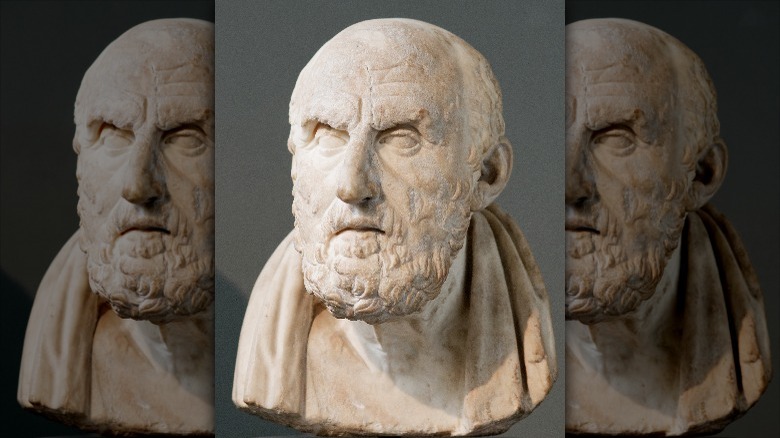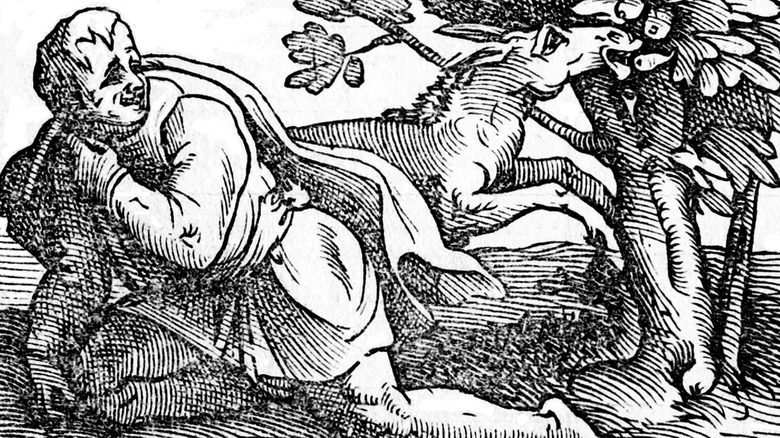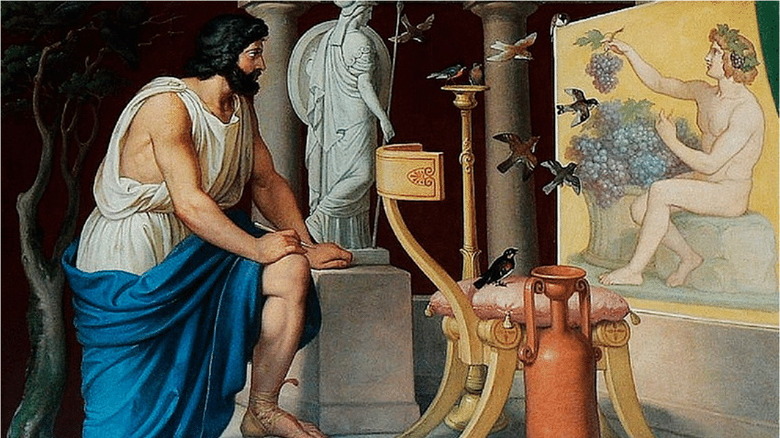Watching A Donkey Eat Figs Is Said To Have Made A Greek Philosopher Literally Die Of Laughter
While it might seem like something out of a cartoon or a "Monty Python" sketch, it turns out that it is actually completely possible to laugh until you die. According to the American Journal of Medicine, the condition is called laughter-induced syncope, and while rare, it has been recorded a number of times. One of the earliest recorded cases was of a 62-year-old man who kept fainting with laughter over what was apparently a particularly hilarious episode of "Seinfeld" in 1997. Episodes of laughter-induced syncope have caused patients' blood pressure and heart rate to drop, necessitating their hospitalization. That said, the BBC reports that in 1975, a man died of a heart attack after laughing a lot at an episode of "The Goodies." But generally speaking, this phenomenon is easily treatable and non-fatal, and the death of the man watching "The Goodies" is believed to have been tied to another pre-existing medical condition.
According to one ancient legend, however, there was at least one case that proved to be a lethal laughing fit. As IFLScience explains, the Greek philosopher Chrysippus is alleged to have died laughing after cracking a joke about a donkey he saw eating some figs. What was the joke? He called out for someone to bring the donkey some wine to wash down the figs. That's it. That was the joke. Surely there was more to it than that, right? Well, read on to find out.
Who was Chrysippus?
Before we look more closely at the circumstances of Chrysippus' death, let's take a look at the man himself. According to the Internet Encyclopedia of Philosophy, Chrysippus was born in the town of Soli in what is now Turkey, sometime around 280 B.C. Before getting into philosophy, he apparently trained as a long-distance runner. But while still young, he became the student of Cleanthes, the successor of Zeno of Citium, the founder of the Stoic school a few decades before. In the years that followed, Chrysippus went on to become one of the most important and influential philosophers of the Hellenistic era (the period following the conquests of Alexander the Great in which Greek culture and thought were spread throughout the Mediterranean world). He was subsequently considered the second founder of Stoicism, and it was a common opinion that Stoicism wouldn't have existed without him.
He is said to have written over 700 books, though only fragments of any of them remain. Over this considerable body of work, he proved himself a master of logic, physics, ethics, and dialectics, in which people with opposing viewpoints try to establish the truth of a proposition through rational discourse. He felt that our fates are predetermined, but he still had hope that we have personal agency in our thoughts and actions. Anyway, super important guy in the history of philosophy, and according to the sources we have, he died because he saw an animal eat some fruit.
The details of his death
The main source we have for the story of the death of Chrysippus is Diogenes Laertius, who — as Britannica explains — was a third-century writer whose most notable work is called "Lives, Teachings, and Sayings of Famous Philosophers," which is considered the most important extant ancient source for the history of philosophy. The lengthy tome is a compilation that includes not only worthwhile biographical information but also silly little anecdotes and gossip. You can read the entirety of his biography of Chrysippus at the Perseus Project if you so choose.
IFLScience summarizes Diogenes by saying that Chrysippus saw the donkey eating all of his figs and called out for an old woman (presumably an enslaved person) to bring out some unmixed wine for the donkey to drink to wash down the figs. This idea tickled him so much that he laughed until he died. That's it. That's the story. Diogenes, however, also offers an alternative account, in which Chrysippus died not of offering wine to a donkey but from drinking too much unmixed wine himself (seen in ancient times as a sign of lack of self-control), became uncontrollably dizzy for five days, and died afterward. According to Diogenes, it wasn't uncommon for Chrysippus to drink immoderately at drinking parties, but the old enslaved person who lived with him said that normally you wouldn't be able to tell except by his walking; "Only his legs get tipsy," she said. So what then is more likely: death by overdrinking, or death at the idea of a drunken donkey?
Other ancient tales of strange laughter
Chrysippus isn't the only person from antiquity who is said to have experienced uncontrolled laughter at something that a modern audience might find completely confounding. According to Oxford Reference, the fifth-century artist Zeuxis is also said to have laughed himself to death. Zeuxis was renowned for the realism of his work; Britannica records the famous story in which he painted a picture of grapes so realistic that birds flew down to try to eat the grapes. According to legend, an old woman commissioned a painting from him and modeled for it (some versions specify that she asked to be painted as Aphrodite, per The Vintage News). And when he had finished his astonishingly lifelike portrait, he thought the funny-looking old woman (possibly dressed as the goddess of beauty) was so hilarious to look at that he laughed until he died.
In a story evocative of Chrysippus' but not involving death, the Roman orator Cicero said the grandfather of the Roman statesman — Marcus Crassus, the man who killed Spartacus — gained the nickname Agelastus ("the unlaughing") because he never smiled or laughed ... except once (via Laudator Temporis Acti). What was it that broke the stone-faced streak of the grim elder Crassus? Well, according to St. Jerome, Agelastus saw a donkey eating thistles (what is it with these dudes and donkeys eating?) and commented that to lips like those, thistles must taste like lettuce. Again: yep, that was it. That's the whole story. Maybe it was funnier in person.



